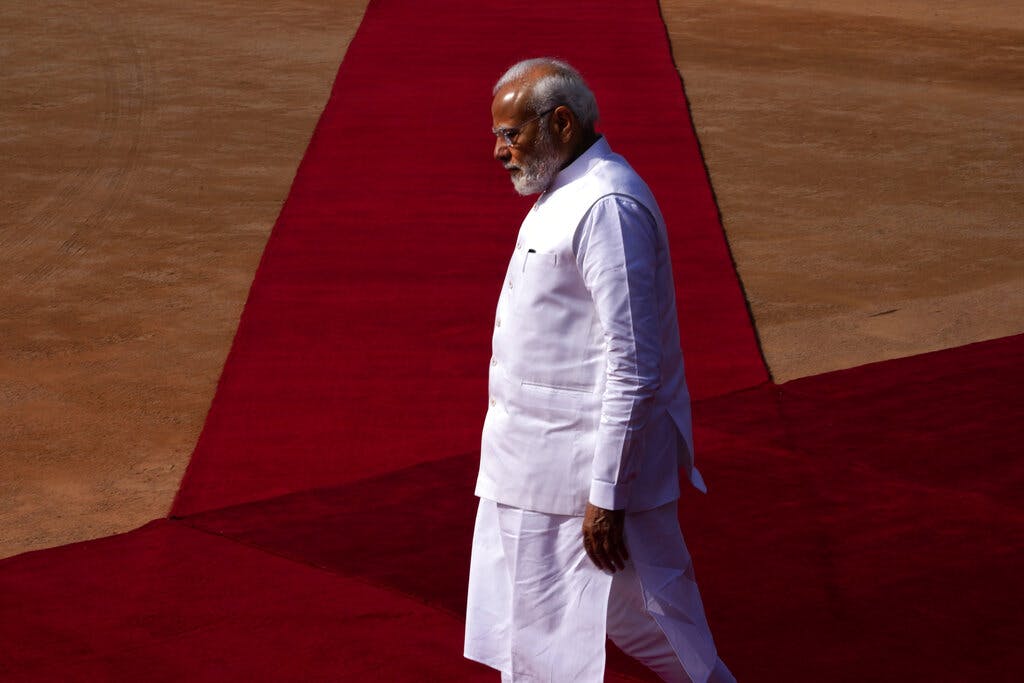India’s Neutral Stance on Russia Frustrates Washington
The Indians simply refuse to condemn or even criticize Russia or President Putin for anything.

Americans have learned one crucial lesson about India in the year since the Russian invasion of Ukraine: Don’t count on India.
New Delhi’s historically “neutral” stance has been reconfirmed numerous times since it gained independence from British rule nearly 75 years ago. Never has Indian neutrality been more sharply etched, though, than in what many Americans see as its maddening position on what the Russians are doing in Ukraine. The Indians simply refuse to condemn or even criticize Russia or President Putin for anything.
“India’s response to the Russian invasion of Ukraine has been distinctive among the major democracies and among U.S. strategic partners,” the Carnegie Endowment’s Ashley J. Tellis writes. “Despite its discomfort with Moscow’s war, New Delhi has adopted a studied public neutrality toward Russia.”
India in recent days has again made clear that in no way is it going to speak ill of the Russians in Ukraine while New Delhi worries about Chinese encroachment across its long northern frontier and is counting on the Russians for oil.
First, India joined 32 nations in abstaining from a nonbinding resolution in the United Nations General Assembly condemning the Russian invasion. Then, a confab of the G-20 nations in the high-tech city of Bengaluru in southern India broke up with a simple “outcome” document after Russia and China refused to go along with the harsh language of a communique that would have echoed the language of the G-20 communique issued at Bali in November.
True, India did not exactly endorse the Russian and Chinese position, but India’s prime minister, Narendra Modi, avoided saying a word about Ukraine while welcoming the 20 finance ministers, including America’s treasury secretary, Janet Yellen, to the first G-20 session chaired by India.
In the end, in the face of Ms. Yellen’s denunciation of the war as “illegal and unjustified,” India’s finance minister, Nirmala Sitharaman, said there was no consensus on a statement that would have called for “the international law and the multilateral system that safeguards peace and stability.” The statement would also have denounced “the use or threat of use of nuclear weapons as inadmissible” — phraseology to which the Russians had reluctantly assented at Bali.
The Americans, obviously frustrated by India’s position on Ukraine, should not be too surprised. As a secretary of state under President Eisenhower, John Foster Dulles, said in 1956, neutrality is “an immoral and short-sighted conception.” The phrase, often used at the time, applied then as now to India’s reluctance to oppose Moscow.
Since those days of often strained relations between New Delhi and Washington, India has shifted to a more accommodating stance in large part because of concerns about China. The Chinese nibbled at India’s northern border in a short-lived war in 1962 and have been sending nervous tremors through New Delhi ever since.
Indian leaders just don’t think they can risk offending Moscow, whose support is also essential vis-a-vis China even if Moscow and Beijing now appear on good terms.
“For many in the United States, including in President Joe Biden’s administration, India’s neutrality has been disappointing because it signaled a sharp divergence between Washington and New Delhi on a fundamental issue of global order,“ Mr. Tellis, a senior fellow at Carnegie with a long background as an adviser to government agencies, writes. At issue: “the legitimacy of using force to change borders and occupy another nation’s territory through a blatant war of conquest.”
For Washington, India’s position is all the more upsetting considering diplomatic moves that would appear to be driving India much closer to de facto alliance with Washington than ever before.
Consider, most remarkably, India’s membership in “the Quad,” the Quadrilateral Security Dialogue that also includes America, Australia, and Japan. “All democracies and vibrant economies,” a Council on Foreign Relations report said, “they work on a broad agenda including security, economic, and health issues.”
The Department of State considers America to be in a “strategic partnership” with India, but the secretary of state, Antony Blinken, has acknowledged India “has had a long and complicated history with Russia going back to the Cold War days.” Indian and Russian troops still engage in joint war games, and Russia sells arms, including fighter planes, to India.
What may count for more, though, are strictly economic ties. “India appears to be pulling off a diplomatic high-wire act between Washington and Moscow,” an offshoot of Japan’s Nihon Keizai Shimbun financial paper, Nikkei, said. Indian imports from Russia, Nikkei said, are up more than 400 percent during the current fiscal year, to $37.31 billion from $7.71 billion.
No wonder, as Mr. Tellis wrote, “India stands shoulder-to-shoulder with the United States in opposing Chinese assertiveness in the Indo-Pacific while at the same time appearing tolerant of the vastly more egregious Russian belligerence in Europe.”

